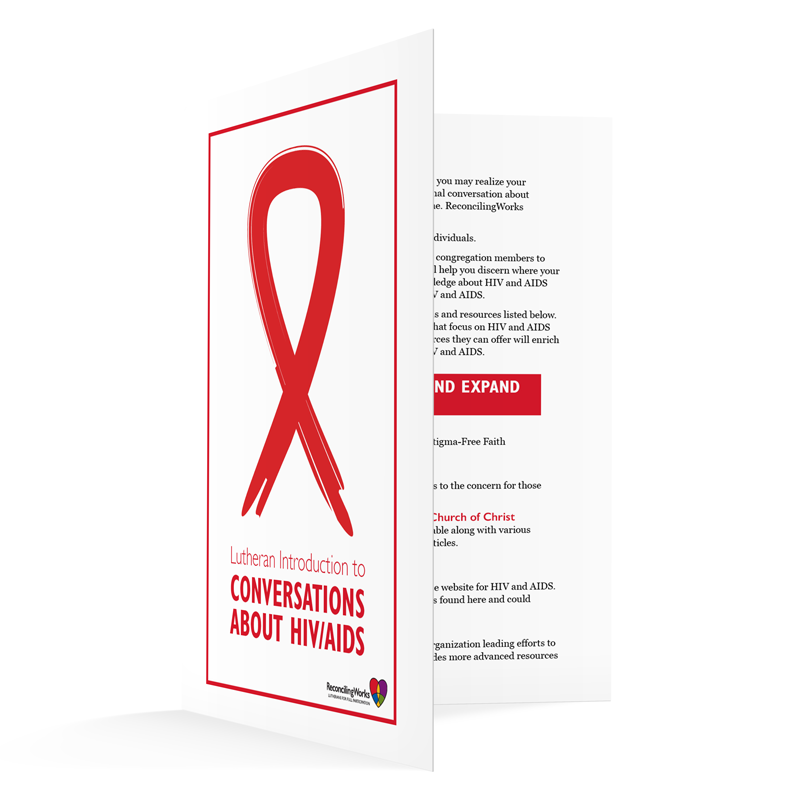More Resource Categories
Racial Justice and Dismantling White Supremacy
- Know Your Rights - AMMPARO
From the Evangelical Lutheran Church in America: Everyone in the United States has certain rights guaranteed under the U.S. Constitution, regardless of immigration status. Given the heightened levels of uncertainty and fear in communities, noncitizens and citizens alike may require even greater accompaniment and comprehensive support during this time and months ahead. Depending on someone’s individual circumstances it may make sense to talk to a lawyer for more specialized assistance. The resources listed on this website can help communities stay generally informed, prepared, and united in support of immigrant neighbors. Note: This information is not a substitute for advice from a lawyer. Laws may vary by state. - One Body Many Members: A journey for Christians across race, culture and class
From the Evangelical Lutheran Church in America: "One Body, Many Members" is a faith-based journey of discovery to learn, share and proclaim God’s intention of oneness among people of every racial, ethnic and class background. How do we find that unity in a world as diverse as ours? How can we build up “one body” as strong as that? - ELCA Guidelines for Ministry in a Multi-Religious World
As Lutherans in North America, we have a remarkable opportunity to live out our Christian vocation in a multi-religious world. No matter where we live, the realities of religious diversity are not “out there,” but in our daily lives with our families, in our congregations, communities, and at work. Our ministries – whether as pastors, deacons, or lay people – are shaped by the religious diversity in our midst. The brand new “ELCA Guidelines for Ministry in a Multi-Religious World” provide a way for our ministries to also be shaped for our multi-religious context. - A Declaration of the Evangelical Lutheran Church in America to American Indian and Alaska Native People
From the Evangelical Lutheran Church in America: In 2021, Church Council approved this declaration on behalf of the ELCA. This declaration addresses Indigenous ELCA communities, Indigenous communities in the U.S., and non-Indigenous ELCA communities. - Land Acknowledgement Guide
On Indigenous Peoples’ Day in 2022, the ELCA published “A Declaration of the Evangelical Lutheran Church in America to American Indian and Alaska Native People,” in which the church confesses its sins toward Indigenous peoples and lists the commitments it will begin working toward as it responds to its original “Repudiation of the Doctrine of Discovery” from 2016. One commitment found in each document is to formally acknowledge the original inhabitants of North America. The declaration states, “We commit to begin the practice of land acknowledgments at all expressions of the church.” Vance Blackfox, Director for Indigenous Ministries and Tribal Relations with the ELCA, has prepared a Land Acknowledgement Guide for those who wish to begin a journey toward truth and healing by practicing land acknowledgments. It includes examples of statements that you can speak at the beginning of every worship service, print at the top of worship bulletins, use to create outdoor signage, and more. Learn more about the ELCA Indigenous Ministries and Tribal Relations. - Campaign Zero
Campaign Zero encourages policymakers to focus on solutions with the strongest evidence of effectiveness at reducing police violence. Our platform is continuously updated in response to the findings and insights of researchers and organizers nationwide. - Troubling the Waters for Healing of the Church
From its beginning in 1988, the ELCA has made a firm commitment to become an increasingly multicultural and an intentionally anti-racist church. Our continual failure to fulfill that commitment raises significant questions regarding the integrity of our witness to God’s love in Christ for the whole creation and causes deep concern for our viability in an increasingly and richly diverse context. Many will be uncomfortable with the phrase “White Christian.” We still prefer to identify ourselves with the culture and country of our immigrant ancestors. Even more disturbing is the word “privilege.” It is far easier for us to identify what we lack than confront the benefits that come to us by virtue of being White. Yet until we, in a spirit of humility and repentance, are willing to explore the power, privilege, and prejudice that belong to us as White Christians, it may be impossible for us to become the multicultural church I believe most of us sincerely desire to be. - "Freed in Christ: Race, Ethnicity, and Culture"
This is the 1993 Evangelical Lutheran Church in America social statement which expresses the church's calling to regard seriously culture and ethnicity, confront racism, to engage in public leadership, witness and deliberation, and to advocate for justice and fairness for all people. - Race Forward and online magazine, Colorlines
- Equity in the Center
Equity In The Center® (EIC) works to shift mindsets, practices and systems in the social sector to center race equity and build a Race Equity Culture™.
Book Recommendations
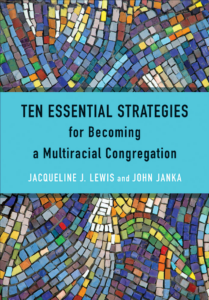 Ten Essential Strategies for Becoming a Multiracial Congregation
Ten Essential Strategies for Becoming a Multiracial Congregation
by Jacqueline J. Lewis
How do churches build immunity from racial and ethnic tensions that threaten to divide rather than unite congregations? Jacqui Lewis and John Janka believe that the answer lies in the development of multiracial, multicultural communities of faith. Born of the authors’ work with The Middle Project, an institute that prepares ethical leaders for a more just society, this book is a collection of wisdom and best practices.
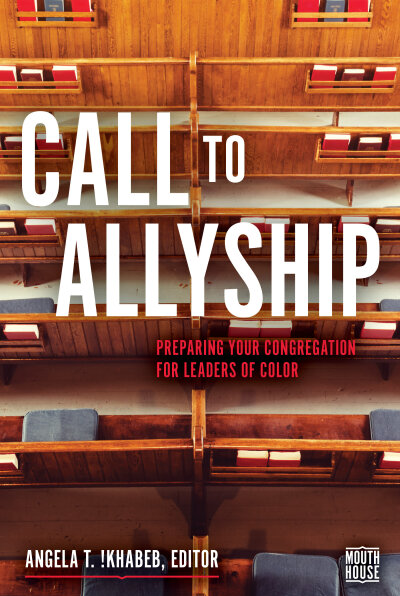 Call to Allyship: Preparing Your Congregation for Leaders of Color
Call to Allyship: Preparing Your Congregation for Leaders of Color
by Angela T. !Khabeb
How can churches do the work of becoming allies for the leaders they call? In belonging to a predominantly white denomination, ELCA members are called to listen and learn from its leaders of color to recognize the assumptions, biases, and harmful actions that result when congregations don’t commit to become allies. Authors offer wisdom, storytelling, and concrete suggestions for churches preparing to call a leader of color. Call to Allyship is a must-read for call committees, church councils, social justice teams, and anyone prepared to do the work of understanding, welcoming, and celebrating these leaders.
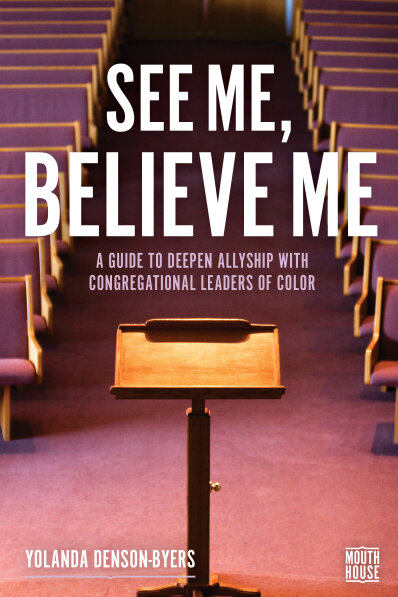 See Me, Believe Me: A Guide to Deepen Allyship with Congregational Leaders of Color
See Me, Believe Me: A Guide to Deepen Allyship with Congregational Leaders of Color
by Yolanda Denson-Byers
In See Me, Believe Me, Rev. Dr. Yolanda Denson-Byers draws from the wisdom and experience she has gained—and the racism she has endured—as a female, Black, and queer pastor in the Evangelical Lutheran Church in America (ELCA). Through storytelling, biblical reflection, and colleague interviews, Denson-Byers offers an honest and unflinching look at the challenges faced by leaders of color in the predominantly white ELCA. See Me, Believe Me is the essential follow-up to Call to Allyship: Preparing Your Congregation for Leaders of Color, another title in the Mouth House series of books that amplify voices for change.
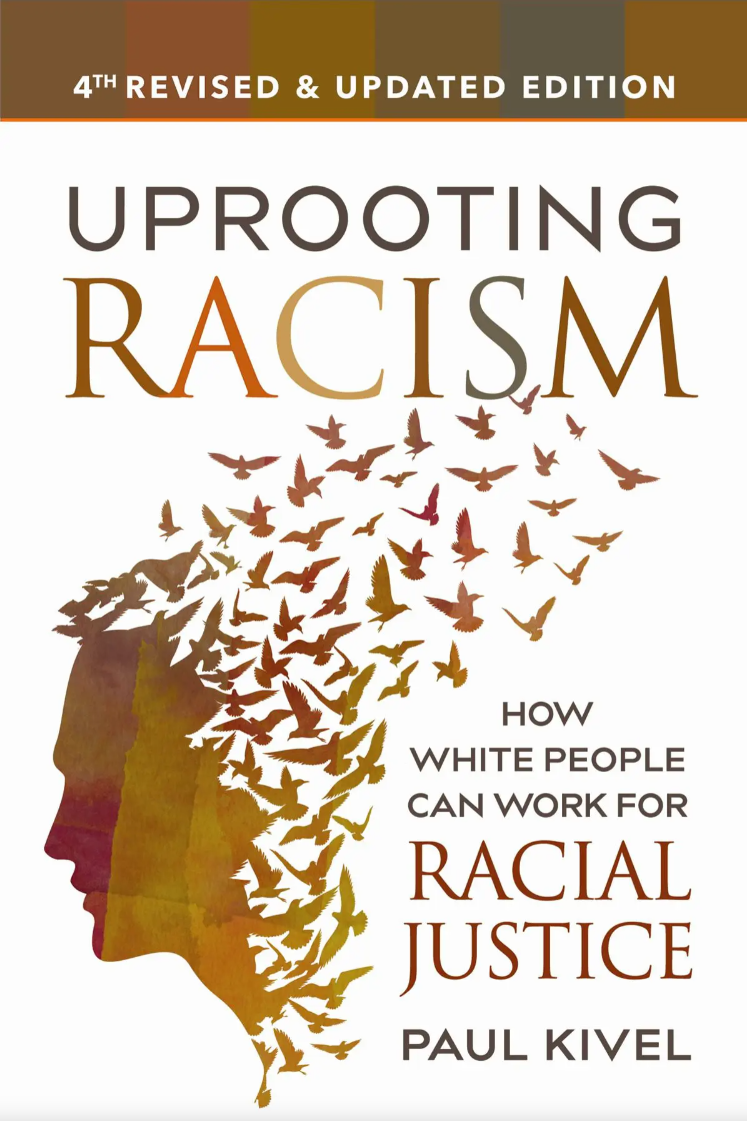 Uprooting Racism - 4th Edition: How White People Can Work for Racial Justice
Uprooting Racism - 4th Edition: How White People Can Work for Racial Justice
by Paul Kivel
There’s a long tradition of white people opposing racism-but there are also many excuses we give for not getting involved. Uprooting Racism is the supportive, practical go-to guide for helping white people work with others for equal opportunity, democracy, and justice in these divisive and angry times. Completely revised and updated, this fourth edition of Uprooting Racism offers a framework around neoliberalism and interpersonal, institutional, and cultural racism, along with stories of resistance and white solidarity. It provides practical tools and advice on how white people can work as allies for racial justice, engaging the reader through questions, exercises, and suggestions for action, and includes a wealth of information about specific cultural groups such as Muslims, people with mixed heritage, Native Americans, Jews, recent immigrants, Asian Americans, and Latino/as.
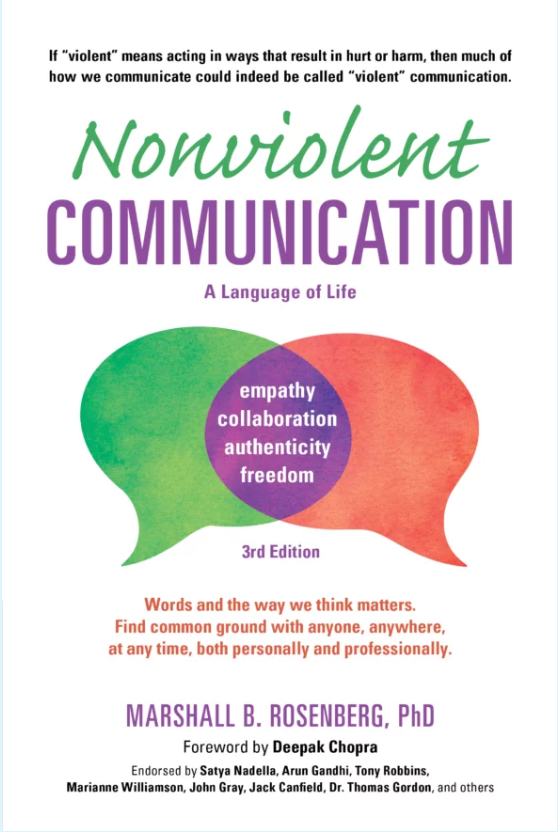 Nonviolent Communication: A Language of Life
Nonviolent Communication: A Language of Life
by Marshall B. Rosenberg PhD
Life-Changing Tools for Healthy Relationships: Nonviolent Communication is the integration of four things: Consciousness (a set of principles that support living a life of compassion, collaboration, courage, and authenticity), Language (understanding how words contribute to connection or distance), Communication (knowing how to ask for what we want, how to hear others even in disagreement, and how to move toward solutions that work for all), and Means of influence (sharing “power with others” rather than using “power over others”). Nonviolent Communication serves our desire to do three things: Increase our ability to live with choice, meaning, and connection; connect empathically with self and others to have more satisfying relationships; and sharing of resources so everyone is able to benefit.
Advocacy for LGBTQIA+ communities
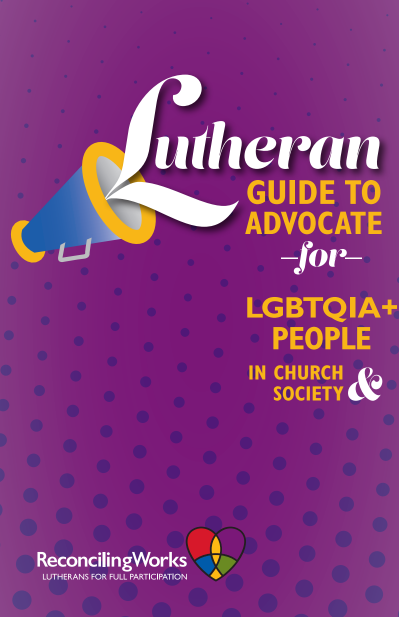 Lutheran Guide to Advocate for LGBTQIA+ People in Church and Society
Lutheran Guide to Advocate for LGBTQIA+ People in Church and Society
This resource is a starting point for you and your Lutheran faith community as it seeks to advocate for lesbian, gay, bisexual, transgender, queer, intersex, and asexual/aromantic (LGBTQIA+) people in church and society. It is ReconcilingWorks’ hope that tools and answers in this guide will give your community the boldness to proclaim Christ’s gospel of radical inclusion and hospitality to your neighbors, our church, and our world. Christ and Lutherans are called to care for everyone, against discrimination and marginalization, and work for justice.- Equality Federation
Equality Federation is the movement building and strategic partner to state-based organizations advocating for LGBTQ people. From Equality Florida to Freedom Oklahoma to Basic Right Oregon, we amplify the power of the state-based LGBTQ movement. We work collaboratively on critical issues - from advancing workplace fairness and family recognition to defeating anti-transgender bathroom bans and HIV criminalization laws - that affect how LGBTQ people experience the world from cradle to grave. Together with our partners, we work on cross-cutting issues impacting our community such as racial equity, reproductive justice, and immigration.
Disability & Neurodiversity
- ELCA Disability Ministry
People with intellectual and developmental disabilities have faith needs and desires similar to anyone else. They have Spirit-given gifts to offer, and they are individuals who want to worship God and use their gifts to build up the body of Christ. Like all Christians, they want to be included in the kingdom of God.
- People Living with Disabilities
ELCA social message, “People Living with Disabilities,” makes a significant point in identifying an emphasis on people who are living with disabilities, rather than categorizing some people as “handicapped” or “disabled.” - A Neurodiverse Church: An interview with author Daniel Bowman Jr.
Living Lutheran interview by Cara Strickland on Daniel Bowman Jr. and his book, On the Spectrum: Autism, Faith, and the Gifts of Neurodiversity. - Autism-Friendly Activity Bags for Church
"For children with autism, the noise and movement of an average worship service can be challenging. For their families, finding a welcoming church home can be just as difficult. This issue inspired two Pennsylvania congregations, St. Mark, Clifton Heights, and Temple, Havertown, to dedicate this past September’s “God’s work. Our hands.” Sunday to doing their best to change the status quo." Read more from Living Lutheran's article by Krista Webb.
HIV/AIDS
- Lutheran Introduction to Conversations About HIV/AIDS
Inspired by ReconcilingWorks' engagement at the 21st International AIDS Conference in July, this new conversation resource will help your Reconciling in Christ (RIC) community discern how to be a more hospitable space for those living with HIV and AIDS.
Allies Against Bullying
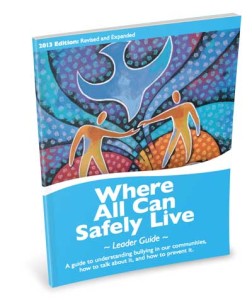 Where All Can Safely Live - Revised and Expanded
Where All Can Safely Live - Revised and Expanded
This anti-bullying curriculum is an introduction to what bullying is, how it functions, and why we as Christians are called to prevent it from happening in our communities. It was developed with the help of the staff at the Pacific Violence Prevention Institute, from the pioneering research on bullying by Dan Olweus, and materials created by the United States government. This curriculum is not intended to be a comprehensive guide to stopping bullying. However, this guide provides a basic understanding of how bullying works and offers suggestions for steps in creating a congregational bullying prevention plan.
Reparative/Conversion Therapy
- "Report of the APA Task Force on Appropriate Therapeutic Responses to Sexual Orientation"
The American Psychological Association task force conducted a systematic review of the peer-reviewed journal literature on sexual orientation change efforts (SOCE) and concluded that efforts to change sexual orientation are unlikely to be successful and involve some risk of harm, contrary to the claims of SOCE practitioners and advocates.


